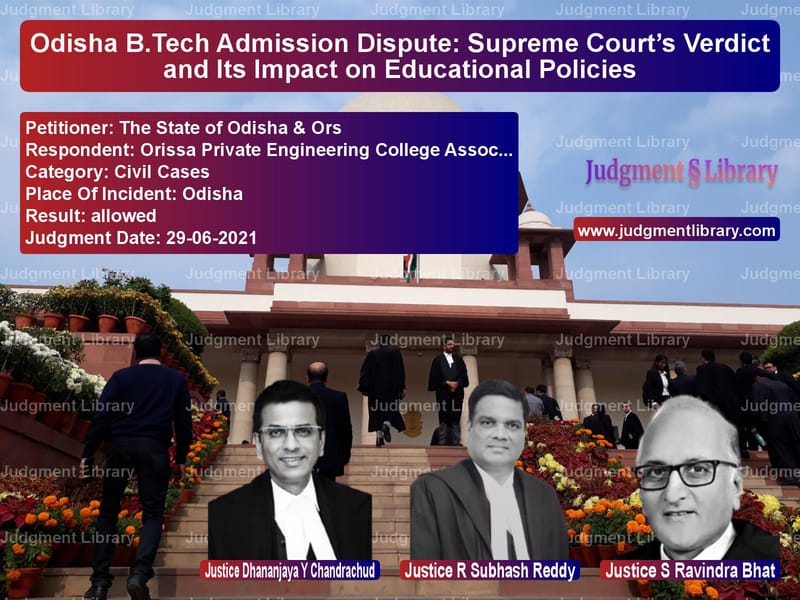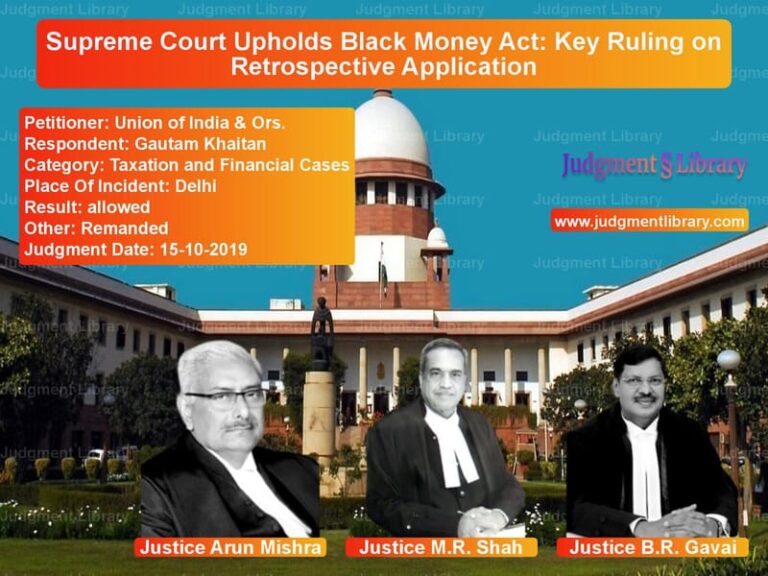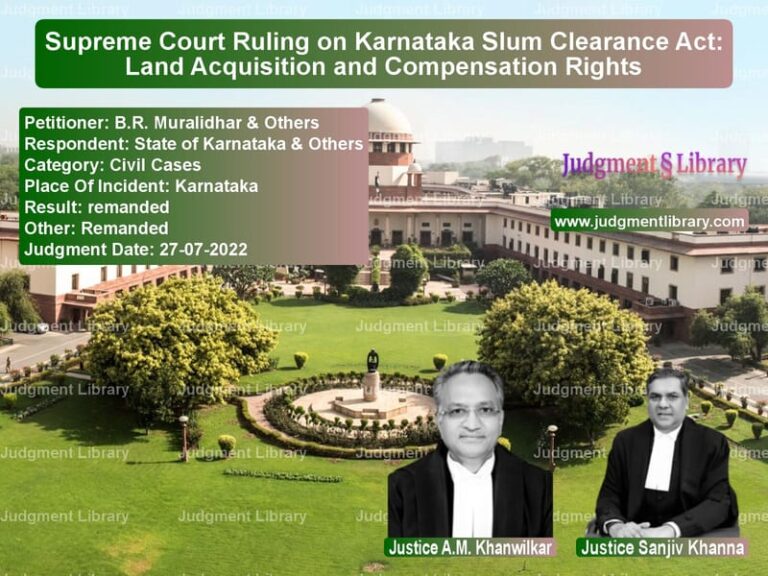Odisha B.Tech Admission Dispute: Supreme Court’s Verdict and Its Impact on Educational Policies
The legal dispute between The State of Odisha & Ors and Orissa Private Engineering College Association (OPECA) & Anr revolved around the admission process for B.Tech degree courses in Odisha for the academic session 2020-21. The primary issue concerned whether admissions could be granted based on marks obtained in qualifying examinations instead of a centralized entrance test, as mandated by the Odisha Professional Educational Institutions (Regulation of Admission and Fixation of Fees) Act, 2007.
The Odisha High Court had earlier ruled in favor of engineering institutions, allowing them to admit students based on their qualifying examination marks, citing the relaxation provided by the All India Council for Technical Education (AICTE) for PGDM/MBA courses due to the COVID-19 pandemic. However, the Supreme Court overturned this decision, stating that the High Court’s direction was contrary to Section 3(1) of the 2007 Act, which mandates that admissions be conducted through an entrance test approved by the government.
Background of the Case
In Odisha, the Odisha Professional Educational Institutions (Regulation of Admission and Fixation of Fees) Act, 2007 governs the admission process for technical education. Section 3(1) of the Act states that all admissions to professional courses must be made through an entrance test approved by the government, followed by centralized counseling based on merit. This ensures a uniform and transparent admission process.
However, the outbreak of the COVID-19 pandemic disrupted educational schedules and examination procedures across the country. In response, AICTE issued a circular on August 19, 2020, allowing admissions to PGDM/MBA courses based on qualifying marks instead of entrance examinations. This relaxation was introduced due to logistical challenges faced by students and institutions during the pandemic.
The Orissa Private Engineering College Association (OPECA) filed a petition under Article 226 of the Constitution, seeking the same relaxation for B.Tech admissions. The Odisha High Court, in its order dated December 24, 2020, directed AICTE and the State Government to decide whether this relaxation should extend to engineering courses.
Key Legal Provisions Involved
- Section 3(1) of the Odisha Professional Educational Institutions Act, 2007: Mandates that all admissions to private professional educational institutions, government institutions, and sponsored institutions be made through an entrance test approved by the government.
- AICTE Circular Dated August 19, 2020: Allowed PGDM/MBA courses to admit students based on qualifying examination marks instead of entrance exams due to COVID-19 disruptions.
- Article 226 of the Constitution: Empowers High Courts to issue writs for the enforcement of fundamental rights and other legal rights.
Arguments Presented by the State of Odisha
The State of Odisha, represented by Solicitor General Mr. Tushar Mehta, argued that the High Court’s directive was unlawful. The key arguments presented were:
- The Odisha Professional Educational Institutions Act explicitly states that admissions must be through entrance exams, ensuring merit-based selection.
- Allowing admissions based on qualifying examination marks would violate statutory provisions and compromise educational standards.
- The AICTE circular was limited to PGDM/MBA courses and did not extend to engineering courses.
- The High Court’s directive was contrary to legislative intent and statutory mandates.
Arguments by OPECA and Admitted Students
On the other hand, Mr. Siddhartha Dave, appearing for OPECA, and Mr. Gaurav Agrawal, representing some admitted students, argued:
- The COVID-19 pandemic made it difficult for students to appear for entrance exams, affecting admissions.
- Only a small fraction of the available seats had been filled through entrance exams, leaving thousands of seats vacant.
- 592 students had already been admitted under direct entry and 243 through lateral entry, and canceling their admissions would cause irreparable hardship.
- The AICTE circular’s rationale applied equally to engineering courses, and the State Government should have exercised discretion to implement similar relaxations.
Supreme Court’s Observations and Ruling
The Supreme Court bench, comprising Dr. Dhananjaya Y Chandrachud, R Subhash Reddy, and S Ravindra Bhat, analyzed the case and made the following key observations:
- The High Court’s directive violated Section 3(1) of the 2007 Act, which mandates admissions through entrance exams.
- The AICTE itself had clarified that its relaxation applied only to PGDM/MBA courses and not to B.Tech admissions.
- The State Government had the discretion to decide admission modalities, but it was bound by statutory provisions.
- The High Court’s order overstepped its jurisdiction by directing admissions contrary to law.
However, considering the extraordinary impact of the COVID-19 pandemic and the fact that many students had already been admitted, the Supreme Court exercised its power under Article 142 of the Constitution to grant an exception.
Relief Provided to Admitted Students
While setting aside the High Court’s judgment, the Supreme Court recognized the hardship that would be caused to students who had already secured admission. The Court ruled that:
- The admissions of 592 students under direct entry and 243 students under lateral entry should not be disturbed.
- This relief was granted solely due to the exceptional circumstances of the pandemic.
- Future admissions must strictly comply with Section 3(1) of the 2007 Act.
Impact of the Judgment
The Supreme Court’s ruling reaffirmed the importance of entrance examinations in ensuring a merit-based admission process. The key takeaways from the judgment include:
- The judiciary upholds statutory provisions while balancing equity and fairness.
- AICTE’s role is crucial in regulating admission policies, and its guidelines must be followed.
- Educational institutions must adhere to legal requirements to maintain admission integrity.
- In extraordinary circumstances, the Supreme Court may exercise its discretionary power under Article 142 to prevent undue hardship.
Conclusion
The dispute over B.Tech admissions in Odisha highlights the legal complexities surrounding education policies, especially in unprecedented situations like the COVID-19 pandemic. While statutory mandates must be followed, the Supreme Court’s intervention ensured that students admitted under extraordinary circumstances were not unfairly penalized.
The appeal was allowed, and the High Court’s order was set aside, but the admitted students were permitted to continue their courses. This judgment sets a precedent for balancing statutory compliance with equity and fairness in legal disputes.
Petitioner Name: The State of Odisha & Ors.Respondent Name: Orissa Private Engineering College Association (OPECA) & Anr.Judgment By: Justice Dhananjaya Y Chandrachud, Justice R Subhash Reddy, Justice S Ravindra Bhat.Place Of Incident: Odisha.Judgment Date: 29-06-2021.
Don’t miss out on the full details! Download the complete judgment in PDF format below and gain valuable insights instantly!
Download Judgment: the-state-of-odisha-vs-orissa-private-engin-supreme-court-of-india-judgment-dated-29-06-2021.pdf
Directly Download Judgment: Directly download this Judgment
See all petitions in Education Related Cases
See all petitions in Public Interest Litigation
See all petitions in Judgment by Dhananjaya Y Chandrachud
See all petitions in Judgment by R. Subhash Reddy
See all petitions in Judgment by S Ravindra Bhat
See all petitions in allowed
See all petitions in supreme court of India judgments June 2021
See all petitions in 2021 judgments
See all posts in Civil Cases Category
See all allowed petitions in Civil Cases Category
See all Dismissed petitions in Civil Cases Category
See all partially allowed petitions in Civil Cases Category







